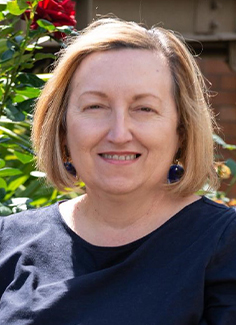Career
Copyright@ Australian Catholic University 1998-2026 | ABN 15 050 192 660 CRICOS registered provider: 00004G | PRV12008
Copyright@ Australian Catholic University 1998-2026 | ABN 15 050 192 660 CRICOS registered provider: 00004G | PRV12008

How do you feel about entering the world of professional work? Excited about building your career and network? Nervous about finding a role or having new responsibilities? Looking forward to having more disposable income? Whatever your expectations, it’s never too early to start preparing to land that first big job.
We spoke with careers advisor Lorella Masci, from ACU’s Careers and Employability team, about the top things a university student can do to appeal to employers and secure work they want.
“The top skills employers look for include teamwork, communication skills and interpersonal skills,” Lorella said. “We source that information from annual Australian Association of Graduate Employers (AAGE) data, and those three things are consistently in the top 10.
“Other important skills are things like having initiative and problem-solving – skills that help a graduate contribute to an organisation and make them a good cultural fit for the organisation. And then we look at other things beyond the more cognitive skills, like resilience, or being able to bounce back from difficult times, and having emotional intelligence, being able to understand the emotions of people you work with and understand your own emotions.
“Employers also say that graduates can lack an understanding of the organisation and commercial awareness of the industry, so you really need to do your research before you apply for a job and go for an interview. Ask yourself, do you understand the organisation, its values and how it fits into the market? What is the organisation doing as a leader in its field? Is there any research or any special projects it’s contributing to?”
“The best way to highlight your skills is to start with a ‘stock take’. Journalling is fantastic for that, but often we aren’t aware of our skills and strengths, or we’re shy or modest talking about them. So, I encourage students to do a lot of online skills tests or quizzes that might show skills they’re already aware of, and some they’re not. One I recommend is the VIA Character Strengths Survey.
“Once you know your skills, highlight those in your resume, sharpen up on how to talk about them in interviews, and detail them on your LinkedIn profile. It’s really important to make sure that your skills and experiences match up across those three areas.
“Think about any experiences where your skills have been shaped or developed, for example, on placements or through any real-world applications of your course, and when you have demonstrated those skills. We talk about using the STAR method, where you describe a situation that you’ve been in where you’ve used that skill, the particular task you performed and the actions you took, and the result you had from that. It makes the experience more authentic when you need to relay your skills to someone else.”
“The most important thing is that it’s authentic and it represents who you really are, because if you’re painting a picture of someone you’re not, it does unravel at an interview. Also, don’t shy away from selling yourself and tailoring your resume to the actual job description. Graduates do have limited work experience, so perhaps you need to focus on other things you have to offer, such as those transferable skills you’ve learned or developed across various aspects of your life.
“The other thing you need to look at is tailoring your resume so that it projects you into the future: ‘This is who I want to be.’ Our templates include a ‘career objective’ statement at the top, where you state who you are, what you’re about, and what you hope to gain or are looking for in a career.
“Projecting yourself into the future is really important, as that helps to paint a clear picture of who you are. Plus, it’s a great exercise for crystallising what it is you want to achieve. It helps build that confidence in yourself too. When you write a resume, you think, ‘Wow, I am really quite good’, and that puts you in the right mindset for the next stage of the application process.”
“LinkedIn is useful for networking and connecting, and I’ve found it particularly good for professional development. I engage with people in the fields I’m interested in, and I find it really helpful when they post stories or articles or research. It can be a good learning tool if you are shy about networking and reaching out to people, and it helps you see the current trends in the industry.
“So, it’s great for doing research on what organisations you might like to work with, who works in those organisations, who does the hiring and seeing if you can connect with them without being too forceful. And it’s great for starting to develop your networking skills and strategies.”
“Networking is very important, and it’s really beneficial for students to start networking behaviours early and to practise, shape and refine them.
“Networking is about building contacts and developing a support network. It can be about developing enough rapport and trust in someone that they would become your referee. Networking certainly helps there, and it does need to happen from the first year in your studies.
“You might network with people who have supervised you on placement, for example. And we always encourage students to join their professional association while still a student as the membership fees are quite affordable and the membership can offer professional learning and networking events. All of this can help with finding employment. If you’re known within your field, then that trust is already there with an employer.
“Networking helps you to build your own professional and personal brand as well. Who do you want to be seen as? How do you want to be viewed? That can happen through LinkedIn, but also in the way you present yourself at an event for example. We often talk about the elevator pitch and how to create one and when to use it. Get your elevator pitch ready to go, as that can help break the ice at an event or even a social gathering – you never know who knows who.”
“It depends on the industry. So if you’re a physiotherapist, you definitely need practical experience, and placements are part of your study, but if you’re studying commerce, you may just do one internship or work-integrated learning subject in a specific workplace.
“Practical experience is important for all students though and worth seeking. We encourage students to find part-time work from the start of their course, and not just one in retail or hospitality, but a part-time job that aligns with their future pathway. So, if you’re studying education, you might work in after school hours care. Some students I know who are studying business and majoring in finance are lucky to have secured a job as a teller in a currency exchange organisation.
“Being exposed to the industry early is important because it’s part of your career exploration; it helps you know what you enjoy and what you’re good at. It can be challenging and daunting if you’re doing a generalist degree like arts or commerce to work out which pathway you’re going to take, so it’s important that you either set up an internship in your degree or explore careers through your part-time work opportunities and volunteering or community engagement.”
“It’s never too soon. Many students think about it in their final year, but I think it’s something that you should start doing from the beginning. Not to secure a job, but as part of your career exploration: exploring the market, being aware of industry trends, what jobs are available, what you could do with your degree.
“Part-time work can also help you start that exploration. I say to students, get a job at a bank part-time if you think you want to work in finance, and at least you’re getting a foot in the door.
“Start to develop an understanding of different organisations, and what organisations offer graduate programs and whether you want to go that way. Because a graduate program can be a safe way to start a career where you are highly supported, you get to rotate around different aspects of the work and there could be possibility of permanent employment after that.
“Graduate programs usually open early in your final year and internships start around the end of second year. So you do need to be thinking about work and being proactive all along. In some industries with a skills shortage, such as education, students are snapped up pretty quickly, but even then, you can think about what sort of setting you’d like to work in and where.”
Lorella Masci is a careers advisor with the Careers and Employability team at ACU and has 20 years’ experience in secondary education. She has a deep interest in supporting students to discover their own personal strengths and capabilities as they explore career pathways and develop a plan for this next chapter of their career lifespan.
Lorella is a member of the Career Development Association of Australia (CDAA), Australia’s peak body for career counselling, and the National Association of Graduate Careers Advisory Services (NAGCAS).

Copyright@ Australian Catholic University 1998-2026 | ABN 15 050 192 660 CRICOS registered provider: 00004G | PRV12008